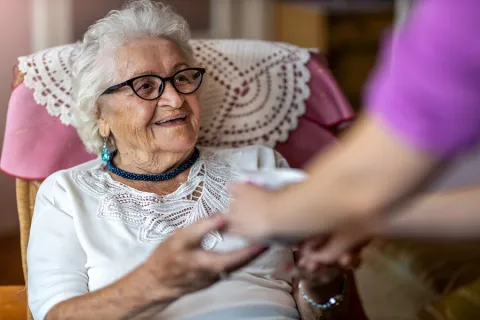Caring for Loved Ones with Dementia

About 6 million Americans have Alzheimer’s disease, which is the most common form of dementia. Alzheimer’s dementia is a progressive brain disease that causes a variety of mental impairments, such as memory loss, difficulty performing everyday tasks, changes with the senses, and problems with reasoning and judgment. Symptoms usually get worse over time. Many families are not only taking care of children but parents as well. As they get older, you may decide to have your parents live with you because they are no longer able to perform everyday tasks without some assistance. Safety is paramount if you have someone in your house with dementia.
Home Safety Tips for Loved Ones with Dementia
Read these safety and well-being tips:
- Look in garages, workrooms, basements, and outside areas for tools, chemicals, cleaning supplies, and other potentially hazardous items.
- Prevent unsafe stove usage by applying stove knob covers, removing knobs or turning off the gas when the stove is not in use.
- Disconnect the garbage disposal.
- Discard toxic plants and decorative fruits that may be mistaken for real food.
- Be prepared for emergencies. Keep a list of emergency phone numbers and addresses for local police and fire departments, hospitals, and poison control helplines.
- Make sure carbon monoxide and smoke detectors are in working order. Keep fire extinguishers available.
- Keep walkways and rooms well lit.
- Consider removing guns and other weapons from the home or storing them in a locked cabinet. As the disease progresses, the person may not recognize someone they have known for years and view them as an intruder. With a gun accessible, the result could be disastrous.
- Place medications in a locked drawer or cabinet. To help ensure that medications are taken safely, use a pillbox organizer or keep a daily list or other organization methods.
- Remove tripping hazards.
- Watch the temperature of water and food. It may be difficult for the person living with dementia to tell the difference between hot and cold.
- Closely monitor the use of an electric blanket, heater, or heating pad to prevent burns or other injuries.
- Secure bookshelves, cabinets and large TVs to prevent tipping.
- Install grab bars for the shower, tub and toilet to provide additional support. Apply textured stickers to slippery surfaces to prevent falls. Consider installing a walk-in shower.
- Install safety locks on washing machines and dryers to prevent inappropriate items from being put in or taken out too early. Clean out lint screens and dryer ducts regularly to prevent fires.
- Limit access to lawnmowers, weed trimmers and snow blowers.
- To avoid confusion, do not rearrange the furniture in your home. Keep a regular routine for daily activities. Tell your parents in advance about any change in the routine, such as a doctor’s appointment.
- Get your parents an identification bracelet should they wander off.
Print the safety checklist from the Alzheimer’s Association.
Caring for a parent is rewarding but can also be stressful and at times can feel overwhelming, but remember you are not alone. Reach out to your primary care provider if you are struggling or have questions.
Guest Blogger: Beth Mazyck, MD, Fitchburg Family Practice
Note: The content of this blog is for informational purposes only. It is not intended for use as diagnosis or treatment of a health problem or as a substitute for the professional consultation of a physician or qualified health care provider. If you have specific questions or concerns regarding a health or medical condition, contact your physician or a licensed health care professional.

